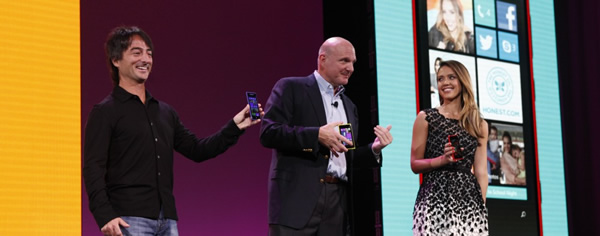The always very excitable Microsoft CEO Steve Ballmer unveiled Windows Phone 8 today, outlining a number of new features and improvements over WP7x. Microsoft, of course, hopes WP8 will be the key to increasing the software giant's smartphone market penetration against well-entrenched rivals Google and Apple.

In addition to the new bells and whistles, WP8 will also be rolling out on "killer hardware" according to Ballmer, most notably the Nokia Lumia 920 and HTC Windows Phone 8x. The HTC 8X ships with a 4.3-inch, 720 x 1,280 with an impressive pixel density of 342 PPI. The device also features a snappy Qualcomm S4 1.5GHz dual-core processor, 1GB of RAM, 16GB of internal storage and an 8-megapixel f/2.0 rear camera. The Lumia 920 boasts slightly better specs overall, more of which you can read about here.
Just a few of the new WP8 features being touted are a highly-customizable lock screen, granular access controls for children, on-the-fly data compression for snappy browsing over slow data connections while using IE10 mobile and a strong focus on Windows 8 interoperability. In fact, Microsoft just released a WP8 synchronization app to its Windows Store for Windows 8 users.
Speaking of which, just prior to the introduction of Windows 8 last week, Microsoft also launched the Windows Store – a place where early adopters of Windows 8 can purchase and download apps to their PCs and Surface tablets. Although the Windows Store remains in its infancy, variety will most definitely not be an issue: Microsoft announced the store already houses over 120,000 apps.
With both Windows 8 RT and WP8 sharing a common core based upon ARM architecture, we can probably expect to see "universal" apps which will work for devices running either OS. Currently though, Microsoft's app stores remain divided: Windows Store is for Windows 8 users while the Windows Phone Store is for mobile phones. By the way, Microsoft claims its Windows Phone Store has 46 of the top 50 apps smartphone users enjoy.